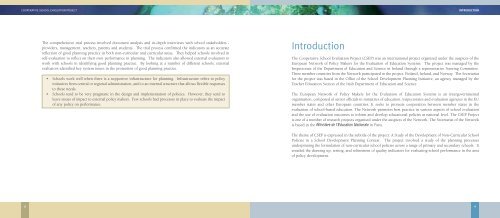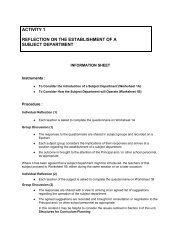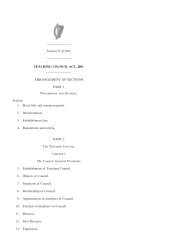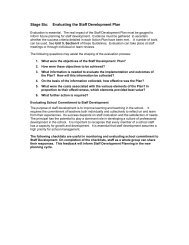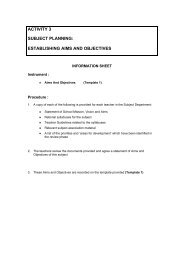Co-Operative School Evaluation Project (File Format PDF 550KB)
Co-Operative School Evaluation Project (File Format PDF 550KB)
Co-Operative School Evaluation Project (File Format PDF 550KB)
Create successful ePaper yourself
Turn your PDF publications into a flip-book with our unique Google optimized e-Paper software.
COOPERATIVE SCHOOL EVALUATION PROJECT<br />
INTRODUCTION<br />
The comprehensive trial process involved document analysis and in-depth interviews with school stakeholders -<br />
providers, management, teachers, parents and students. The trial process confirmed the indicators as an accurate<br />
reflection of good planning practice in both non-curricular and curricular areas. They helped schools involved in<br />
self-evaluation to reflect on their own performance in planning. The indicators also allowed external evaluators to<br />
work with schools in identifying good planning practice. By looking at a number of different schools, external<br />
evaluators identified key system issues in the promotion of good planning practice.<br />
• <strong>School</strong>s work well when there is a supportive infrastructure for planning. Infrastructure refers to policy<br />
initiatives from central or regional administration, and to an internal structure that allows flexible responses<br />
to these needs.<br />
• <strong>School</strong>s tend to be very pragmatic in the design and implementation of policies. However, they tend to<br />
leave issues of impact to external policy makers. Few schools had processes in place to evaluate the impact<br />
of any policy on performance.<br />
Introduction<br />
The <strong>Co</strong>operative <strong>School</strong> <strong>Evaluation</strong> <strong>Project</strong> (CSEP) was an international project organised under the auspices of the<br />
European Network of Policy Makers for the <strong>Evaluation</strong> of Education Systems. The project was managed by the<br />
Inspectorate of the Department of Education and Science in Ireland through a representative Steering <strong>Co</strong>mmittee.<br />
Three member countries from the Network participated in the project: Finland, Ireland, and Norway. The Secretariat<br />
for the project was based in the Office of the <strong>School</strong> Development Planning Initiative, an agency managed by the<br />
Teacher Education Section of the Irish Department of Education and Science.<br />
The European Network of Policy Makers for the <strong>Evaluation</strong> of Education Systems is an intergovernmental<br />
organisation, composed of senior officials in ministries of education, inspectorates and evaluation agencies in the EU<br />
member states and other European countries. It seeks to promote cooperation between member states in the<br />
evaluation of school-based education. The Network promotes best practice in various aspects of school evaluation<br />
and the use of evaluation outcomes to inform and develop educational policies at national level. The CSEP <strong>Project</strong><br />
is one of a number of research projects organised under the auspices of the Network. The Secretariat of the Network<br />
is based in the Ministère de l’Education Nationale in Paris.<br />
The theme of CSEP is expressed in the subtitle of the project: A Study of the Development of Non-Curricular <strong>School</strong><br />
Policies in a <strong>School</strong> Development Planning <strong>Co</strong>ntext. The project involved a study of the planning processes<br />
underpinning the formulation of non-curricular school policies across a range of primary and secondary schools. It<br />
entailed the drawing up, testing, and refinement of quality indicators for evaluating school performance in the area<br />
of policy development.<br />
8<br />
9


